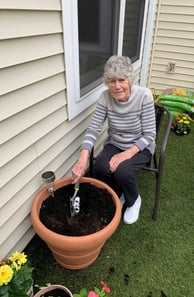We are closely monitoring the coronavirus (COVID-19). Read our statement here.

How Communities Enrich the Lives of Memory Care Residents
Schedule a Tour When a loved one is diagnosed with Alzheimer’s disease or dementia, instinct leads most families to believe caring for them at home is best. However, that may not always be the case. Families are often surprised to find that the specialized care and supportive environment in memory care enrich the lives of residents in ways that are not as easily achieved at home. Here’s how.
When a loved one is diagnosed with Alzheimer’s disease or dementia, instinct leads most families to believe caring for them at home is best. However, that may not always be the case. Families are often surprised to find that the specialized care and supportive environment in memory care enrich the lives of residents in ways that are not as easily achieved at home. Here’s how.
What Is Memory Care?
While memory care may have been recommended as a solution that would benefit your loved one with Alzheimer’s disease or another type of dementia, many families aren’t familiar with it assuming it’s just another name for senior living. Memory care is actually a type of senior living; however, it’s designed just for those with Alzheimer’s disease or other types of dementia. In our memory care communities, you’ll find specially-trained staff, individualized support, 24-hour supervised care, a safe, comforting environment as well as opportunities to be active, have a purpose, and experience joy each day.
Although not every memory care community is the same, there are usually some common features that you can expect such as:
- Private or semi-private accommodations
- An onsite registered nursing team
- Medication monitoring
- Support with daily tasks such as bathing, dressing, and eating
- Three daily meals
- Fitness programs and social activities
- Housekeeping and linen services
- Secured building access and personal emergency response alarms
Enriching the Lives of Memory Care Residents
We firmly believe that memory loss doesn’t have to stop your loved one from enjoying life. That’s why our communities are focused on enriching the lives of our memory care residents with opportunities to learn, grow, and have fun while supporting their unique needs. We encourage independence as much as possible, but also offer the peace of mind that comes with knowing our specially-trained team is never far away. Specific benefits of our memory care include:
- Specialized training – This gives staff a deeper understanding of dementia and its effects on the brain, how to care for the specific needs of those with dementia, techniques for managing challenging behaviors, and effective communication strategies. What’s more, training is ongoing so we can continue to incorporate the latest in research and dementia care.
- Individualized care – We know dementia affects each person differently and as such, our licensed nurses will create an individualized care plan to ensure you get the support and onsite medical care you need. From support with daily tasks such as bathing, dressing, and eating to medication monitoring to regular health assessments to wellness programs, we’re here to help your loved one thrive.
- Daily activities – This could include sensory stimulation, cognitive therapies, physical and occupational therapies, and exercise that your loved one may not be able to access as regularly at home. Here your loved one will have plenty of opportunities to interact socially as well. But it’s all within the comfort of a familiar daily structure, often with the same caregivers.
- Unique therapies – Memory care residents also benefit from music, art, and/or pet therapy. Research has shown these types of therapies can help to reduce aggression and agitation for those with Alzheimer’s and other types of dementia that your loved one may struggle with at home.
- Supportive dining – While mealtime may be a challenging experience at home, here your loved one will enjoy nutritious dining options that are easy to chew and may include finger foods to promote independence. However, dining assistance is also available if needed. Plus, it’s all in an intimate setting where they can feel comfortable and relaxed.
- A comforting environment – Our memory care environment is designed not only to be safe and secure but also comforting for residents. Memory care residents also benefit from amenities such as housekeeping and linen services, scheduled transportation, secure building access, and sensory alarms for prompt assistance.
For more information, download our Just the Facts Guide to Memory Care today!

